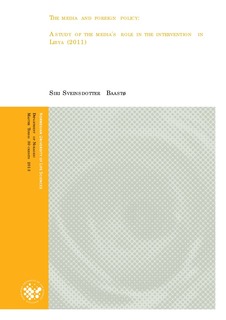| dc.description.abstract | The academic goal of this thesis is twofold: Firstly, to look at the case of the intervention in Libya and better understand the role of the media in this specific international intervention. Secondly, the aim is to provide more knowledge of the role of the media in international interventions, and thus hopefully be able to strengthen the theoretical linkage between media/foreign policy. In order to do so, four countries involved in the intervention in Libya, namely Britain, the United States, Norway and Denmark, are studied through Piers Robinson’s ‘policy-media interaction model’ (2002). This model analyzes both the media coverage of the situation in Libya in leading national newspapers in these countries, as well as the domestic political climate in the four countries during the period of policy debate leading up to the policy decision to intervene. The empirical findings from this thesis indicates that the media did have an influence on the policy decision to intervene in particularly the United States, but also to a certain extent in Denmark, Britain and Norway. This influence of the media laid primarily in the media’s ability to open up for non-official sources in the coverage of the situation in Libya. By doing so, the media enabled non-official frames to become the dominant ones in the coverage, something that made the Libyan authorities lose legitimacy and increased the legitimacy of the Libyan opposition. By contrasting the findings from Libya with Syria, a case of non-intervention, this thesis also argues that the media can be a decisive factor in understanding why the international community chooses to intervene in some humanitarian crisis, while not in others. The empirical findings point to the importance of assessing to what extent non-official sources manage to affect and lead the coverage on a foreign policy issue, and thus affect the way that issue comes to be understood. The more independent the media are in portraying a crisis, and the less dependent the media are on official sources, the more likely it is that the media may influence the way a crisis is approached, and thus the political reaction to the crisis. The empirical findings of this thesis also points to three aspects that, integrated within the ‘policy-media interaction model’, may provide a more comprehensive understanding of the possible influence the media may have on a foreign policy decision. | no_NO |
